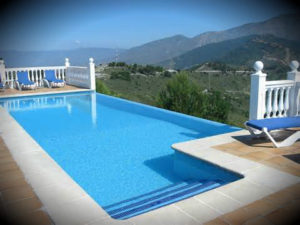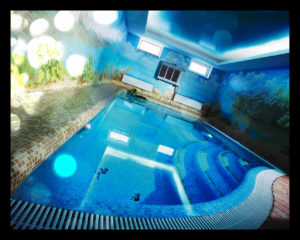Swimming Pool Heating System
Which heating system is best for your swimming pool? In most cases you’ll be able to choose between electric, gas, and solar heating systems, but the best system for your situation will vary depending on where you live and what your specific needs are. So which is best? The answer to that question depends on a fairly long list of factors, including your budget, location, the size of your pool, and how and when you normally use it.
Having your own private, heated pool is definitely an enjoyable luxury in cooler weather, but if you don’t already have a heating system installed, you’ve first got to decide which system is best for your pool. Usually you’ll be able to choose between an electric, gas, or solar powered heating system, but there are plenty of factors to consider when deciding which is right for your pool, and for you. Each of the three options has some particular advantages and disadvantages.

Electric Heat Pump Systems
Electric systems don’t generate their own heat; instead they use electricity to pump heat to the pool’s heating unit. They work by circulating the pool’s water through a filtration and heating unit. The heater draws air from outside using a fan, and uses a combination of refrigerants, evaporation coils, compressors, and condensers to transfer heat to pool water. Heated water is then returned to the pool.
Electric heat pump systems are very energy-efficient (often more efficient than gas systems), but in certain circumstances lose efficiency very quickly. Most systems operate most efficiently at outside temperatures of more than 45 to 50 degrees Fahrenheit, but lose efficiency quickly if the temperature decreases. The system will still operate effectively, but it will require more electricity to do so, because the cooler outside temperature forces the system to work harder to heat water.
When choosing an electric system, the size of your pool, your local climate, and when and how you plan to use the heater are all important factors to consider. Efficiency and cost are also important to your budget. The value to watch for is the Coefficient of Performance (COP), which measures the efficiency of electric systems. The higher the COP, the more efficient the system; however because different manufacturers use different efficiency tests, the COP won’t always provide a direct comparison between different systems.
Electric systems are usually more expensive than gas-fired systems. Over time, however, the costs of each will even up somewhat, as electric systems are usually more efficient, and have lower annual operating costs. Properly installed and well maintained, an electric heating system will run smoothly for at least ten years.

Gas-Fired Systems
Gas-fired heating systems have long been a popular choice, despite their inefficiency as compared to electric and solar systems. Newer gas models are much more efficient than their predecessors, but even so they are still at a disadvantage. However, the relative efficiency of each system depends greatly on your local climate, and its suitability depends on your pool use habits, so there are going to be cases where gas is the best option.
Gas systems are perhaps the most simple. They burn natural gas or propane, and heat the pool’s water by drawing water through a filter into the heating unit. The water is heated via proximity to the unit’s combustion chamber.
The beauty of a gas-fired heating system is that water can be heated quickly?much more so than electrical or solar powered systems?and it can be heated regardless of external weather conditions. A gas-fired system can maintain any temperature you desire no matter what the weather. This quality, coupled with the lower efficiency and higher operating cost of the gas system, makes them really ideal for heating a pool which doesn’t see regular use.
To check the efficiency of a gas-fired system, use the ?heater efficiency’ ratio. This is expressed as a percentage, and refers to the amount of fuel the unit consumes versus the amount that is wasted when heating water. For example, unit operating at 55% heater efficiency uses 55% of the gas it consumes in heating pool water, wasting 45% in the process. On the other hand, a 95% efficient system wastes only 5% of the gas it consumes.
More efficient systems are naturally more expensive, but over the life of the unit, it’ll pay for itself if you use the pool regularly. Choosing a 95% system over a 55% system will save a little over $400 a year. Given that a properly installed and maintained system will last at least five years, you can potentially save more than $2,000 in annual heating costs.
Solar-Powered Systems
Solar heating is an extremely cost-effective method of heating a swimming pool, but the suitability of these systems is heavily dependent on your local climate.
Solar heating systems include four main parts: a pump, a solar collector through which water is circulated, a filter to remove debris from water entering the collector, and a valve which can be manipulated to divert water to the solar collector.
The solar collector itself is a panel (or panels) installed on the home’s roof. Water enters the collector and is heated, then returned to the pool. Depending on the collector being used, it can also heat water used in the home. In addition, in hot climates the system can be used to cool water down by diverting it to the collector at night rather than during the day.
Start-up costs for solar systems are competitive in comparison to gas and electric systems. The real difference in cost is in annual operating costs, where solar heating definitely comes out the winner.
Another advantage is that once installed, they’re relatively simple to maintain, and a well installed and properly maintained solar heating system will usually operate smoothly for at least ten and up to twenty years.
Heating System Installation
Regardless of the type of system you choose, it’s almost always best to hire a professional swimming pool contractor for installation. It’ll cost extra, of course, but heating systems must be properly installed and configured for maximum efficiency, so it’s an expense that will more or less pay for itself in the long term.
If you choose a solar heating system this is particularly important? A professional pool contractor is an absolute necessity in this case, as there are additional issues, such as safety and local building codes, to consider during planning and installation. Choose a certified or licensed contractor with experience in working with the type of system you plan to use for the best results.
Don’t forget that your heating system will need annual tune-ups and will probably require servicing periodically, too. Again , it’s usually best to hire a professional for this work to keep the system in tip-top condition.
Recent Comments